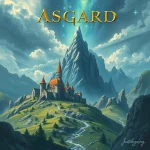
When Grendel is introduced in Beowulf, he is referred to as a completely Christianised monster:
That fiend from Hell,/that harsh spirit, was known as Grendel . . . With fulsome monsters/this sorrowful man had remained some time,/Because the Shaper had condemned him/as Cain’s kinsman. (ll. 101-107)
Because the Beowulf poet, probably a monk employed in a monastery (possibly in Mercia), needs to produce a monster who’s from the Christian world, instead of towards the questionnable world…
When Grendel is introduced in Beowulf, he is referred to as a completely Christianised monster:
That fiend from Hell,/that harsh spirit, was known as Grendel . . . With fulsome monsters/this sorrowful man had remained some time,/Because the Shaper had condemned him/as Cain’s kinsman. (ll. 101-107)
Because the Beowulf poet, probably a monk employed in a monastery (possibly in Mercia), needs to produce a monster who’s from the Christian world, instead of towards the questionnable realm of Scandinavian or Germanic tribes, he gives Grendel a scriptural pedigree–a descendant of Cain, who’s cursed by God while he murders his brother, Abel. Aside from explaining Grendel’s scriptural origin, the poet also results in a monster who’s basically by means of a guy, in Grendel’s situation, a huge, but nonetheless recognizable like a man. Later, when Beowulf and Grendel fight at Heorot, Beowulf mortally wounds Grendel by tearing off his arm.
Simultaneously that we’re given Grendel like a kinsman of Cain, however, the poet also clearly links Grendel to his Scandinavian and Germanic relatives. Grendel, possibly when a man, evolves right into a monster while he, like Cain, has spent a lot time among monsters:

. . . for that Measurer banished him/for his crime, from humankind. Misbegotten creatures found existence then,/eotens and elves and orkneys,/in addition to giants, who fought against with God. (ll. 109-113)
Eotens are giants or some other sort of unspecified monsters, and elves (ylfe) are, in Scandinavian and Germanic mythology, supernatural entities who’re most frequently regarded as opponents of mankind or at best not always friendly to mankind. Both Scandinavian and Germanic mythology includes creatures that the Beowulf poet describes in Old British as eotens and elves, which might be symbolic of ogres and trolls. In Old Norse, for instance, the term for elves (ylfe in Old British) is alfar–clearly, both words have a similar origin. It is probably the word orkneys (in Old British, orcneas) describes evil spirits or monsters by means of whales (the killer whale, for instance, is definitely an orca). The Scandinavian people could have been completely acquainted with whales the Germanic people less so.
To sum it up, then, while Grendel appears to become produced from supernatural beings both in Scandinavian and Germanic mythology, the Beowulf poet, while he is writing a poem for any Christian audience, turns the initial questionnable monster right into a scriptural creature.
Resourse: https://enotes.com/homework-help/


